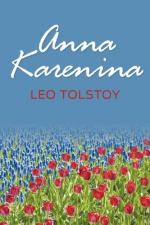|
|
Anna Karenina Author/Context
Leo Nikolayevich Tolstoy was born on August 28, 1828 into an aristocratic family who lived near Moscow. For years his family had been well acquainted with the Tsar's inner loop. At age nine, he was left an orphan and raised by his aunt. Seven years later, aged 16, he entered the University of Kazan, where he was heavily influenced by the 18th century philosopher Jean-Jacques Rousseau. Rousseau believed, as Tolstoy did, in the value of a simple life. Tolstoy left the university in his third year, before ever getting his official degree.
Tolstoy then began to change. He spent time in loose living and wrestled with the guilt this engendered. He knew he believed in God, but he had no interest in joining an organized religion. He soon began to realize that city life was not for him.
With that, he went back to his family's estate near Moscow, called Yasnaya Polyana, which in English means "Clear Glade." He devoted himself wholly to his peasants and developed a system, mentioned in Anna Karenina, where he sold his peasants portions of his land so they, too, could be part owners of the land they were tending. But the peasants didn't always trust Tolstoy because he was a nobleman, and Tolstoy grew frustrated that he couldn't establish a better relationship with them. Angry, he went back to Moscow and once again engaged in a life of revelry, drinking, gambling and womanizing. He grew restless, all the time seeking a meaning for his life. It was then that he published Childhood, Boyhood and Youth.
In 1851, Tolstoy followed his brother Nicholas into the army, serving in the Caucasus, where he fought Tartar guerilla troops. There for four years, he published an account of the Crimean War, writing as he fought.
In 1855, he left the army and departed for St. Petersburg, where he had already made a name for himself from his published account of the war, called Sevastopol Sketches. Once Tolstoy arrived at the city, however, he decided again that it was not for him. He resented the simplistic views of the city people and chose instead to travel all over Europe studying varying systems of education. He used what he learned in his travels to start a school for children of the peasants in 1859. He rejected the European styles of education, which he found stifling, and rather encouraged wonder and curiosity at his own school, developed at Yasnaya Polyana.
Four years later, Nicholas died of tuberculosis, which left Tolstoy profoundly changed. He recounted the story in Anna Karenina, using Levin to represent himself. Yet one year later, Tolstoy met his wife, Sofia Behrs, and thus began an exciting and productive part of his life, during which he wrote War and Peace and completed Anna Karenina.
In both of these works, and in many of his others, it is easy to see how Tolstoy transposes many of his personal experiences into his fiction. Often his characters experience what he does, struggling through spirituality and contemporary life. Marriage and adultery are big issues, as are spirituality and the theme of city life vs. country life. These themes are prevalent in Anna Karenina.
Anna Karenina, in particular, is a major work because of its exploration of the human psyche and emotions common to any generation in any nation. Tolstoy was a master of dissecting psychology. He excelled in observing the smallest changes in consciousness and recorded these changes with extraordinary detail.
In his biography of Tolstoy, Maxim Gorky writes that Tolstoy once said, "'Man survives earthquakes, epidemics, the horrors of disease, and all the agonies of the soul, but for all time his most tormenting tragedy has been, is, and will be the tragedy of the bedroom.'"
In his later years, Tolstoy became increasingly religious. His youngest son died before he did, and his wife and he were never the same thereafter. His memory began to fade and he finally died, a literary master, in November, 1910.
Tolstoy will long be remembered as a writer who rebelled against the social standards of his day. He had wildly original views on education, the peasantry, and the future of Russia and industrialization, yet spoke of relationships with a universal clarity and detail.
Bibliography
Gorky, Maxi. Lev Nikolayevich Tolstoy. New York: B.W. Huebsch, Inc., 1920.
Orwin, Donna Tussing. Tolstoy's Art and Thought. Princeton University Press, 1993.
Wasiolek, Edward. L.N. Tolstoy: Life, Work, and Criticism. York Press, 1985.




